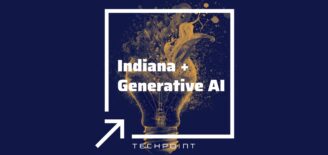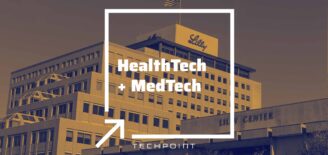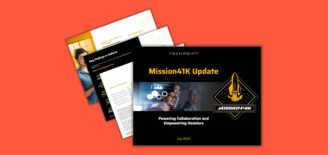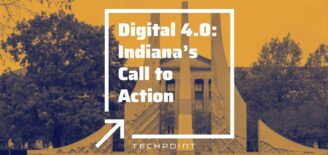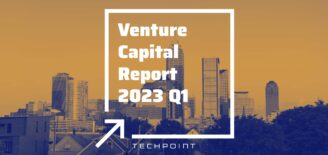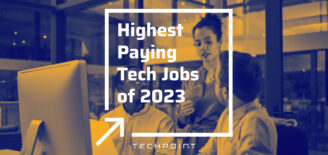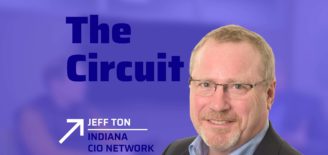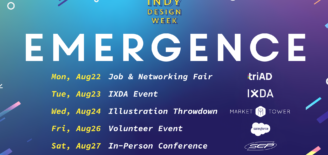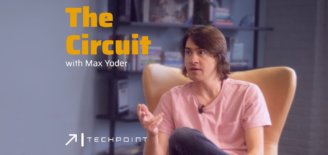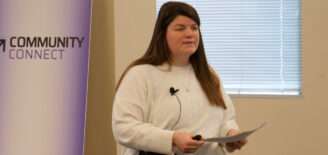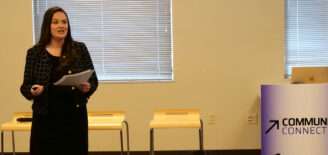Indiana technology and healthcare pros are ready to collaborate more
The new home of the Regenstrief Institute on the near-Westside of Indianapolis was host last week to the first of three workshops dedicated to exploring Indiana’s Opportunities to Lead in Digital Health. It was a fitting site for discussing the intersection of technology and healthcare in close proximity to the Roudebush VA Medical Center, Riley Hospital for Children at IU Health, and Sidney and Lois Eskenazi Hospital.

CollaborationTech and healthcare groups are bringing people together.
Based on the survey responses from just this first event, healthcare and technology pros in the Hoosier state are chomping at the bit to collaborate with each other to improve people’s health.
One survey respondent suggested building an infrastructure to keep things moving and people talking: “I would like to see some sort of web site or place where the various interested entities could come to get information or just set up on-line discussions. I was not aware of many of the people who attended session one. This suggests that we need to do something to break down silos.”
She or he was not alone in that thinking. Another attendee offered: “Find more opportunities for cross-collaborationand discussions (between technology and healthcare professionals) looking at ‘health’ from all angles and develop action-oriented goals with outcomes that benefit the larger population.”

Dr. Titus Schleyer — who was instrumental in putting the event series together — kicked things off by reminding attendees just how advanced Indiana is in the race to digital health dominance.
“In Indiana we have one of the country’s foremost Health Information Exchanges,” Dr. Schleyer said.
Now called the Indiana Network for Patient Care (INPC), Indiana’s original health information exchange was created by Regenstrief in 1988. The scope of the exchange is huge with 25,000 physicians, and 106 hospitals participating. INPC’s long history has positioned Indiana to benefit from technological advances in digital health in ways that no other state or region of the country can lay claim to, but “this is just the beginning … we have to keep working,” Dr. Schleyer said.
See photos from this event on Facebook.
One of the more memorable moments from the breakfast discussion was when Dr. Nir Menachemi, Professor and Department Chair for Health Policy and Management at the IU Richard M. Fairbanks School of Public Health, better defined the American healthcare system.
“We don’t have a healthcare system in America, we have a sick care system,” Dr. Menachemi said. The nodding around the room confirmed that most attendees agree that the focus needs to shift more to prevention than on managing the symptoms of poor health.
Healthcare is increasingly becoming a bigger and bigger chunk of the U.S. GDP because everybody is a part of it, explained Dr. Menachemi. He said it’s hard for him to imagine an industry that doesn’t have an important connection to the challenges we face in healthcare. Trucking, for example, has actually done a lot to reduce pollution, and manufacturing is addressing everything from air and water pollution to noise pollution, which all can have an impact on people’s health.
When it comes to healthcare data, Dr. Menachemi believes that the applications, the solutions are probably going to come from the tech industry.
If you think about it, he’s probably right. The idea of your doctor or a local hospital using your personal medical records in a scheme to improve community health sets off red flags of security risks and privacy concerns.
However, millions of people all over the world share enormous amounts of personal health-related information with tech companies like fitBit and Jawbone. They just don’t necessarily think about it the same way they think about their medical records.
What is your single biggest concern regarding the health of Hoosiers? What is the #1 opportunity you see for tech to help improve the health of Hoosiers?
Please share your thoughts in the comments section below.
Learn more about future events coming up in February (WORKSHOP #2) and March (WORKSHOP #3).
WORKSHOP 2: Can we do better at achieving wellness? Leveraging HIT – FEB 23
WORKSHOP 3: Is personalized care the answer? It’s all about YOU(r health) – MARCH 22
Each workshop will feature two special guest speakers who will deliver brief 10-minute presentations on emerging healthcare research and technologies followed by group discussion and Q&A.


